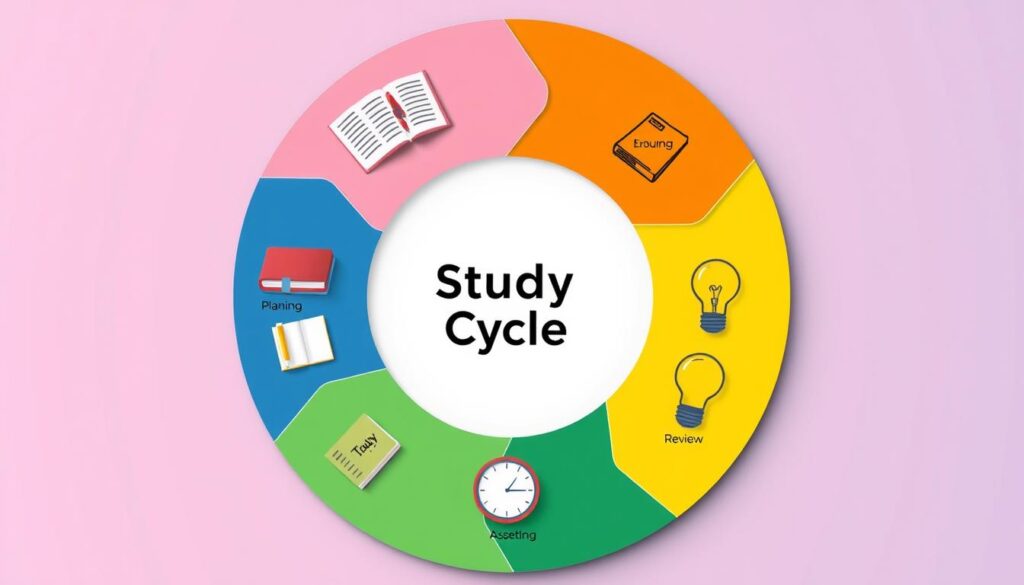When students move from high school to college, they find their old study habits don’t work as well. College classes are bigger, the work is harder, and exams are more important. Using smart study methods can help students do better in their classes and ace exams.
This article will share tips on making detailed study plans for exams. You’ll learn about active learning, the study cycle, and how to space out your studying. Plus, we’ll talk about creating a study plan that fits your needs and how you like to learn Intensive Study Plans For Exams.
Key Takeaways:
- Developing an intensive study plan is crucial for college academic success.
- Active learning strategies can enhance information retention and application.
- Understanding the study cycle helps optimize learning and productivity.
- Spacing out study sessions and practice improves long-term knowledge retention.
- Creating a customized, flexible study plan can boost efficiency and performance.
Active Learning Strategies for Effective Studying
Just reading and re-reading isn’t enough. You need to make connections, form examples, and control your learning. To do well in school, you must use active learning strategies.
Reading is not studying
Reading course materials is a good start. But it’s not enough. Active studying strategies help you understand and remember better. These include making study guides, explaining concepts out loud, and solving practice problems.
Ideas for active studying
- Create study guides with questions and answers
- Explain concepts aloud as if teaching someone else
- Derive examples related to your personal experiences
- Construct concept maps or diagrams to visualize connections
- Develop symbols to represent key concepts
- Identify the big ideas, evidence, and conclusions in non-technical classes
- Work through practice problems step-by-step in technical classes
By actively engaging, you’ll understand and remember more. This way of studying is crucial for success in school.
“The more actively you engage with the material, the better you will understand and remember it.”
Understand the Study Cycle

The Study Cycle by Frank Christ breaks down studying into five stages: previewing, attending class, reviewing, studying, and checking your understanding. Each stage is crucial for effective learning through repetition and practice.
It begins with previewing the material before class. This step activates your prior knowledge and gets you ready for the lesson. Then, attending class and engaging with the content builds on this foundation.
Reviewing your notes soon after class is the next step. It reinforces the information while it’s still fresh. After that, structured studying involves active learning techniques like solving practice problems and creating concept maps.
- Distributed practice, with several focused study sessions a week, is better than cramming before exams.
- Short study sessions of 20 to 30 minutes are more effective than long ones.
- Regularly checking your study methods and being open to change is key for learning.
The last step is checking your understanding through self-testing or explaining to others. This helps you spot any knowledge gaps and adjust your study plan.
By following the Study Cycle, you can make sure you don’t miss any learning opportunities. This maximizes the effectiveness of your study efforts.
Spacing Out and Distributing Practice

Learning efficiently means spacing out your study sessions, not cramming. Studies show that studying in short periods over days and weeks helps you learn better. This method keeps your focus sharp and prevents procrastination.
For memorizing things like names and formulas, flashcards reviewed daily work best. This beats trying to memorize everything in one long session.
Benefits of Spacing Out Study Sessions
Spaced practice means studying over time, not just before exams. Research finds that studying for two weeks is better than cramming the night before. Start planning for spaced practice early, like at the start of the semester.
- Effective learning comes from daily study time and reviewing on alternate days.
- Spaced learning helps you remember information longer.
- Cramming can lead to sleep loss, harming your learning and health.
- Spaced practice improves your grades and future learning.
Students often don’t prepare well for exams, only cramming a few days before. Over 200 studies prove the spacing effect. It shows that spaced practice is better for long-term memory than cramming.
Using spaced practice in your study routine helps you stay focused and retain information better. It’s a proven method to do well in exams and keep learning.
Intensive Study Plans for Exams

Getting ready for exams needs a smart study plan. Intensive study sessions are key to success. These short, focused blocks of 30-45 minutes use active studying like self-testing to learn and remember better.
Unlike long study times, these intensive periods are more effective. They help students learn and remember more. By spreading out these focused study times, students can do better in school.
It’s also important to avoid distractions like social media and multitasking. This helps keep focus and improves learning. With a good plan for intensive studying, students can get ready for exams and reach their goals.
Recommended Steps for Effective Intensive Study Sessions
- Review and organize your notes and course materials before starting your study sessions.
- Engage in active recall and practice through self-testing, flashcards, or practice questions.
- Seek guidance from professors, teaching assistants, or tutors to clarify any concepts you’re struggling with.
- Collaborate with peers to discuss and reinforce your understanding of the material.
- Utilize online resources, such as supplementary videos or study guides, to supplement your learning.
- Take regular breaks to maintain focus and avoid burnout during your intensive study sessions.
| Course | Recommended Study Schedule |
|---|---|
| CE EN 204 | Monday, Tuesday, Wednesday, Thursday, Friday |
| CHIN 202 | Monday, Tuesday, Wednesday, Thursday, Friday |
| STAT 201 | Monday, Wednesday |
| MATH 113 | Monday, Tuesday, Wednesday, Thursday, Friday |
| REL C 225 | Tuesday, Thursday |
By using a structured approach to intensive study sessions, you can learn better. This way, you’ll do well on your exams.
“Consistent, focused study is the key to academic success. Intensive study sessions help me stay on track and prepare effectively for my exams.”
Creating a detailed study plan with these intensive study methods can really boost your grades. It helps you reach your highest potential.
Tips for Creating an Effective Study Plan

Creating a good study plan is key to doing well in school. Knowing how you learn best helps you plan your study time well. Analyzing your individual learning style and preferences, such as whether you can focus for long periods, what times of day you are most productive, and if you need frequent breaks, can help you tailor your study schedule to work best for you.
To start, map out your existing class schedule, work commitments, and extracurricular activities. This helps you see how much time you have for studying. You might need to change your schedule or cut back on some activities to study more.
Plan Study Time for Each Class
Use your course syllabi to estimate the amount of study time needed for each class. Remember, everyone learns differently. With the VU Block Model, you have focused three-hour classes three days a week. This gives you dedicated time for each subject.
Develop a Realistic Schedule and Set Goals
Creating a weekly study schedule by blocking out specific days and times for studying can help you stay organized and on track. Setting both larger semester goals and smaller daily/weekly goals helps you stay focused. It also lets you see how you’re doing.
Incorporate Breaks and Switch Up Study Environments
Building in regular breaks during study sessions, such as stretching, snacking, or engaging in physical activity, can help reinvigorate your focus. Changing where you study, whether on campus or at home, keeps things interesting.
Find a Study Buddy or Group
Studying with a partner or group can provide accountability and motivation, as well as opportunities to explain concepts to each other and identify gaps in understanding time to study also help able to study for long plan how much time add your study sessions plan out which subject accomplish in each study session plan as necessary to meet study plan as necessary socialize more than study study plan works best finding time to study study on which day multi-hour study sessions coordinate study sessions independent study plan assignments and prepare for exams.
Evaluate and Adjust Your Study Plan as Needed
Your study plan should be flexible and adaptable. Regularly evaluating what’s working and what needs to be adjusted, whether it’s your schedule, study strategies, or goals, will help ensure your plan remains effective throughout the semester.
By following these tips and making your study plan fit your needs, you can learn more efficiently. This will help you succeed in your studies.
Also Read : Comprehensive Test Preparation Programs: A Step-By-Step Guide To Success
Conclusion
Creating a detailed study plan with active learning and time management can help students do their best on exams. They should know how they learn best and plan their study time wisely. This way, they can reach their academic goals.
Good exam prep means using many study methods and keeping a routine that works. It’s also important to stay healthy by exercising and getting enough sleep. These habits help students study better and feel good.
By following the tips in this article, students can tackle exam prep with confidence. They will become more focused, organized, and open to learning. This approach helps them succeed and reach their highest potential.
FAQs
Q: How can I create a study plan for my exams?
A: To create a study plan, begin by evaluating your current study habits and learning style. Identify how much time you need to study for each class and develop a schedule that allows you to study for long blocks without distractions. A study plan is an effective way to organize your materials and prioritize what needs immediate attention.
Q: What are some tips for creating a study schedule?
A: Some tips for creating a study schedule include setting aside specific times for each subject, breaking down your study material into manageable sections, and scheduling your study sessions to make sure you cover all necessary topics. It’s important to analyze your current study habits to find what works best for you.
Q: How can I evaluate my current study habits?
A: You can evaluate your current study habits by tracking how much time you spend studying, noting what times you feel most productive, and analyzing what methods help you retain information best. This will allow you to adjust your study plan accordingly and maximize your efficiency.
Q: What should I consider when developing a study plan?
A: When developing a study plan, consider your learning style, the amount of material you need to cover, and how much time you have before your exams. A well-structured plan will help you manage your study time effectively and ensure you are able to study for each class thoroughly.
Q: How can I ensure I study material better?
A: You can study material better if you study a subject immediately after learning it and consistently review it as part of your study sessions. Setting aside time each night to study, even if it’s just for thirty minutes, will reinforce your understanding and retention of the material.
Q: What are some effective study habits for long study sessions?
A: Effective study habits for long study sessions include taking regular breaks, staying hydrated, and keeping your study environment organized. It’s also helpful to alternate subjects or topics to keep your mind engaged and prevent fatigue.
Q: How can I manage my study time effectively?
A: To manage your study time effectively, create a study planner that outlines your daily and weekly goals. Prioritize your tasks based on deadlines and difficulty, and make sure it’s someone who can hold you accountable for sticking to your schedule.
Q: Is it better to study nightly or in longer blocks on certain days?
A: Both methods have their advantages. Studying nightly for thirty minutes can help reinforce material regularly, while studying for long blocks on certain days may allow for deeper immersion in complex topics. A combination of both approaches may work best depending on your schedule and preference.
Q: How can I know if my study plan is effective?
A: To know if your study plan is effective, regularly evaluate your progress and adjust your schedule based on what is and isn’t working. If you find that you are consistently retaining information and feeling prepared for exams, your plan is likely effective.
Source Links
- https://www.intelligent.com/create-a-study-plan/
- https://www.vu.edu.au/about-vu/news-events/study-space/how-to-make-an-effective-study-plan
- https://learningcenter.unc.edu/tips-and-tools/studying-101-study-smarter-not-harder/
- https://www.clemson.edu/asc/documents/active-learning-strategies-1.pdf
- https://finance.uworld.com/our-difference/active-learning/
